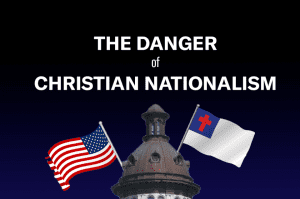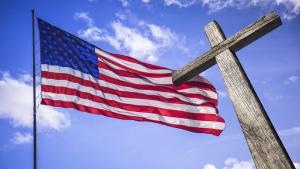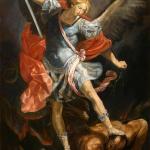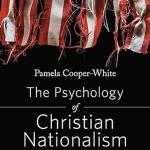
A Christian Nationalist Hornets Nest?
A Christian Nationalist Hornets Nest? That seems to be what an earlier post, “Who is Afraid of Christian Nationalism?” stirred up. Facebook critics are buzzing and stinging. One repeat sting is this: American Christian Nationalism (ANC) is large, nasty, dangerous, and ought not be underestimated. ANC is large because it includes the Proud Boys and January 6 insurrectionists along with churches which display the American flag in the chancel. The Christians Against Christian Nationalism (CACN) nest is abuzz with myriads of angry hornets.
Thank you, my critics, for engaging. Here are some of your stingers:
“you have not been paying attention”
“you ignore the members of congress who are pushing a ACN agenda”
“I have met Christian nationalists in ELCA pews”

“I think we need to understand the breadth and reach of what falls under the common phrase ‘Christian Nationalism’, and to underestimate its impact is dangerous.”
“one of the greatest tricks of evil is to convince people that it does not exist.”
“it’s shameful that a Lutheran theologian would post something so antithetical to our founding theology.”
“when you get fried by the dragon, it will be too late to call it a salamander!”
“If you think you haven’t met a Christian Nationalist, look in the mirror.”
“How can you possibly say this doesn’t exist or isn’t incredibly dangerous? I’m floored.” [Here is a direct quote from the post: “Christian nationalism (CN) exists, to be sure”]
“I’m sorry, have you not seen the new Trump Bible with an American flag on the front and references to the US constitution?” [I included the photo of Trump with his Bible]
“I didn’t read the article, but I find Christian Nationalism to be very scary and threatening.”
The CACN sympathizers sting their disturbers in a manner similar to their avowed opponents, the ACNers. This suggests that it is time to pause and deliberate. What might be provoking the angry mob spirit in two hornets’ nests? The public theologian should pause to engage in discourse clarification.
In my Patheos series on Ressentiment and Compassion, I have sought to provide discourse clarification with regard to Russian Christian Nationalism, American Christian Nationalism, ressentiment in France, and the scapegoating of evangelicals by progressive Christians. All these have much in common. What do they share in common? Anxiety. Anxiety, recall, is the inchoate fear of non-being.
Trump’s Method of Gaining Votes? Ressentiment
Donald Trump and his thugs learned from Ronald Reagan. In the 1980 US presidential election, candidate Ronald Reagan announced that a thermonuclear war with the Soviet Union was imminent. But, with Reagan as Commander and Chief, America could win over Russia and lose only 40 million American lives. Only 40 million! Voters went to the poles trembling in their Nikes. They voted overwhelmingly for the strong man who could protect all of us after losing only 40 million. The fear strategy defeated an otherwise beloved evangelical incumbant Jimmy Carter.

Donald J. Trump watched and learned. In nearly every lengthy speech today he ignites fear: fear of the deep state; fear that traditional values are being undermined; fear that biased judges are prejudiced against him and, therefore, against us; fear that white communities will be poisoned by immigrants; fear that Christianity is under attack by atheist forces; fear that Democrats are traitors. Trump portrays himself as the only mighty savior who can redeem America and make it great again.
It is an effective technique. It gives rise to anxiety. Anxiety stirs the Christian Nationalist hornets nest into a warrior class of wasps out to sting all the enemies that Trump has identified and labeled.
What is the mechanism? What is the trick that turns an otherwise peaceful culture toward hornet-like anger? It’s ressentiment. According to the French term, ressentiment, we re-feel a past injustice in such a way that it incites resentment. With ressentiment we add nuances, connotations, political ideology, scapegoating, and mob violence. The result is a full bowl of fettucine with all the strands intertwining. Shall we begin untwining? Could German philosopher Max Scheler (1874-1928) help in our untwining?
“Ressentiment is a self-poisoning of the mind… It is a lasting mental attitude, caused by the systematic repression of certain emotions and affects which, as such, are normal components of human nature. Their repression leads to the constant tendency to indulge in certain kinds of value delusions and corresponding value judgments. The emotions and affects primarily concerned are [as quoted above] revenge, hatred, malice, envy, the impulse to detract, and spite.” (Scheler 1915, 1994). Cited by public theologian Martin Marty.
Trump’s loyal hornets may include ACNers, to be sure. But what is decisive here is not a combination of pro-Christian and pro-American ideology. Rather it’s the hornets’ anger prompted by anxiety.
Ressentiment among Liberal and Progressive Christians
As a progressive Christian in the delightful bubble of liberalism I inhabit — Berkeley, California — I have not yet met those American Christian Nationalists my critics say lurk in Texas and Michigan. But I certainly feel anxious. And I have witnessed ressentiment at work eliciting anxiety in my Berkeley bubble. My colleagues and I feel enormous trepidation at the prospect of losing our democratic institutions if not our very civilization to a violence-monger such as Donald Trump. We saw what happened in Italy, Germany, Japan, China, and Russia in the last century. I fear that it could happen here in America during my lifetime. The anxiety it elicits tempts me to resssentiment. But I sense that ressentiment would only exacerbate the threat.

My liberal and progressive friends feel an anxiety parallel to that felt by those who turn to Trumperism in self-defense. When progressive anxiety turns into ressentiment, however, our temptation is to lash out against evangelicals. Yes, let’s be honest, evangelicals are the actual target of progressive Christian anger. And the existence of American Christian Nationalism provides the justification — the smokescreen — for the spewing of progressive venum. But is this is not the mirror image of ACN expressed by progressive outrage against ACNers? I would hope that my progressive friends could find a healthier way to handle the ressentiment we feel.
The spirit of anti-ACN is self-destructive, not constructive. It takes the form of scapegoating in order to medicate the pain caused by our fear of losing just and orderly institutions. When the enemy is a fire-breathing dragon, it’s a waste of psychic energy to shoot the salamander.
Two Christian Nationalist Hornets Nests
Emerging from World War II, the standard enemy of American Lutheranism was the Roman Catholic Church. With Vatican II, a threshold was crossed. Lutherans began a warm fellowship with Rome. During the 1970s the Lutherans along with Catholics and Anglicans created a common liturgy. So, nascent progressive Lutherans looked for a new enemy to identify against.
The evangelicals fit the bill nicely. With appropriate educated class umbridge, Lutherans could take a strong stand against praise music and the works-rightousness of evangelical morality. Then by 1980, the evangelicals had become politically influential through their identification with the Republican Party. That sealed it. I recall a seminarian telling me once, “I don’t think the evangelicals are even Christian.”
Listen carefully to the anti-ACN rhetoric. It slips quickly from the description of ACN as an extremist ideology delcaring America to be a Christian nation (which applies to only a handful of nut cases) into a vague denunciation of the power allegedly wielded by evangelical leaders. This sleight of ideological hand makes the target –American Christian Nationalism — loom larger than it is.
My plea to progressive Christians is to carefully select the right target. The source of the anxiety we feel does not come from the Christian nationalist hornets nest. We’ve seen American flags in church chancels for a couple centuries. Oh hum. Rather, our ressentiment is deliberately fueled by a political propaganda machine stoking the same flame that threatens to burn both the ACNers and CACNers. For progressive Christians to flail away at the Christian nationalist hornets nest is to waste valuable psychic energy that could be invested in understanding and combating the real source of our fears, anxieties, and resentments.
PT 3220 A Christian Nationalist Hornets Nest?

CHRISTIAN NATIONALISM RESOURCES
Resentment vs Compassion. Part 1: From Resentment to Ressentiment
Resentment vs Compassion Part 2: From Ressentiment to Reparations
Resentment vs Compassion Part 3: Russian Christian Nationalism
Resentment vs Compassion Part 4: American Christian Nationalism
Resentment vs Compassion. Part 5:” Ressentiment in the White ‘n’ Woke Unhappy Consciousness
Resentment vs Compassion. Part 6: Ressentiment with Compassion
Resentment vs Compassion Part 7: Christian Nationalism’s Decline Narrative
Resentment vs Compassion Part 8: The Unhappy Consciousness Narrative
Resentment vs Compassion Part 9: To Slay the Christian Nationalist Dragon
Resentment vs Compassion Part 10: Don’t trust your pastor
Resentment vs Compassion Part 11: Christian Nationalism vs Anti-Christian Nationalism
Resentment vs Compassion Part 12:. A More Compassionate America? Trump Tyranny.
Resentment vs Compassion Part 13: Christian Nationalism versus the Vermin Curse
Resentment vs Compassion Part 14. Does Anti-White Christian Nationalism Scapegoat Evangelicals?
Resentment vs Compassion Part 15. Evangelicals Against Christian Nationalism
PT 3219 Who is Afraid of Christian Nationalism?
▓

For Patheos, Ted Peters posts articles and notices in the field of Public Theology. He is a Lutheran pastor and emeritus professor at the Graduate Theological Union. He co-edits the journal, Theology and Science, with Robert John Russell on behalf of the Center for Theology and the Natural Sciences, in Berkeley, California, USA. His single volume systematic theology, God—The World’s Future, is now in the 3rd edition. He has also authored God as Trinity plus Sin: Radical Evil in Soul and Society as well as Sin Boldly: Justifying Faith for Fragile and Broken Souls. See his website: TedsTimelyTake.com.
▓














